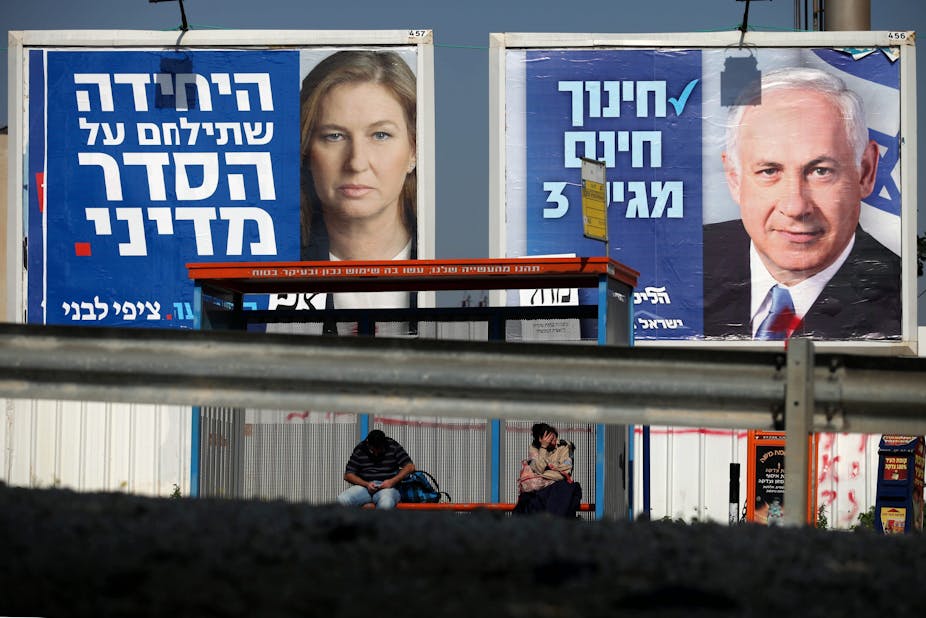In all the language used to discuss the Israel-Palestine situation, “dilemma” is surely the most redundant.
A dilemma implies that there are two equal alternatives to opt for and that one must be foregone. There is a decision, and the protagonist must choose.
But the time has long passed since there was a viable and imaginable alternative to Israeli domination of the land.
The two-state solution of the Oslo Accords is a charade that only diplomats and the terminally optimistic cling to in a kind of “I hope we can still be friends” mentality. The prospect of there ever being a feasible Palestinian state in existence alongside Israel has been slowly but surely suffocated.
And thus on the eve of an election Benjamin Netanyahu can flip the world the finger and declare that there isn’t even a remote chance that he will be dismantling any Israeli settlements in the West Bank.
“The days when bulldozers uprooted Jews are behind us, not in front of us,” he said in a newspaper interview. “Nobody has any lessons to give me about love for the Land of Israel or commitment to Zionism and the settlements.”
A ‘one-and-a-bit-state’ solution
That Netanyahu will be returned to office this week is fairly certain. The only question will be how much of a majority he will have and which particular parties he will have to include in his coalition.
For that reason, and with up to four more years of Bibi ahead, any possible determination of a two-state solution becomes ever more impossible, no matter how many diplomatic goals the Palestinians can kick in the UN.
Instead we are left with a “one Jewish state plus a remainder” scenario.
A future Palestinian state has been made unfeasible by the years of relentless slice-and-dice building and dismantling programs carried out by Israel. Jewish settlements go up and Palestinian dwellings are cleared for “security reasons”. Secure road corridors for the settlers further partition Palestinian land into penny-packets, hindering movement and commerce.
A scattered set of enclaves has therefore replaced a contiguous territory. If, as Netanyahu promises, none of these obstructions are to be surrendered, it is impossible to imagine a workable Palestinian state in the West Bank.

At the other end of the country, the futile rocket attacks from Gaza make it easy to keep justifying such physical security measures. The retribution meted out for these strikes has left the Gaza Strip in a medieval state of development, with the UN predicting life there will become almost unviable by 2020.
On top of this is the continuing failure of the Palestinian leaders to put aside their own differences and move in a united manner. No matter the progress Mahmoud Abbas makes on the international stage, the hot-heads in Hamas and the other factions make it easy for Netanyahu to shrug his shoulders and stay away from the negotiating table.
The old idea of trading peace for land is passé: the Israelis have most of the land and with even a small percentage of the Palestinians refusing to be peaceful, there is no need for Netanyahu to give up any turf.
All politics is local
As ever with the Middle East, things are not all black and white. The impending Israeli election has been slightly different from previous ones in that socio-economic concerns have been running parallel with security issues in voters’ minds.
Israel has weathered the global financial crisis comparatively well, but concerns like housing, unemployment and economic opportunity are major considerations. Building settlements is of course one way to alleviate some of the housing shortage, and give a boost to economic activity, but the next government will also need to keep an eye on more prosaic household issues.
Meanwhile there is no need for Netanyahu to split the opposition. They do that well enough themselves, with a continual splintering into smaller parties. His greater concern is the strengthening voice of minor groups on the same side as himself but further towards the extreme of religious Zionism.

The rise of the Bayit Yehudi (Jewish Home) party has been a case in point. The religious tail wagging the secular dog is an ever present tension in Israeli politics and Netanyahu will be worried about how much traction such parties will have in any coalition. In any case though, they will only be driving him towards increased settlement construction and even less accommodation with the Palestinians.
Israel has won
The two state solution is dead, at least in the sense of creating a Palestinian entity that would be independently viable. The nomenclature may take a bit longer to expire, but it is unimaginable that there will be such a roll-back of Israeli influence as to allow a functioning Palestinian state in co-existence with its Jewish neighbour.
A “state” implies some autonomy and an internal monopoly of control. The Palestinians only control what Israel allows them to. Palestinian authority exists in enclaves not deemed currently necessary for Israel to exert direct governance over.
There is therefore no longer an Israel-Palestine dilemma. Only an Israeli victory and a Palestinian plight.

